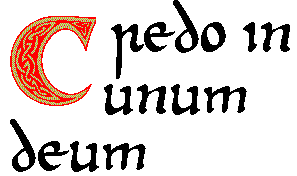 What is a "Creed"?
What is a "Creed"? What is a "Creed"?
What is a "Creed"?Creed \'kreed\
[ME crede, from OE creeda, from Latin credo ("I believe" the first word of the Apostles' and Nicene creeds), from credere to believe, trust, entrust; akin to OIr cretid "he believes"]
1: a brief authoritative formula of religious belief
2: a set of fundamental beliefs
3: a guiding principle
The Creeds and Confessions produced by the Christian Church over the centuries are not inspired additions to Scripture nor in any way replacements for the words of Christ and his apostles or the prophets which preceded them. Instead these human documents are carefully considered and usually thoughtfully worded responses to various issues, heresies and historical situations that have troubled the Church and the world over the centuries. Creeds are statements of faith that are true and authoritative insofar as they accurately reflect what Scripture teaches. Those linked here have been found useful either by the entire Church or by important segments and/or denominations of it over the ages. They are thus helpful "measuring sticks" for orthodoxy. Canons but not the canon.
Some have said the creeds are man made and hence should be ignored in favor of Scripture. Should we then dispose of all sermons, Bible study texts, commentaries, doctrinal outlines, books on theology, devotionals, et cetera? Certainly not! The creeds do not masquerade as Scripture and many specifically point out that it is the Scriptures themselves which are "the only infallible rule of faith and practice." Yet as Christians is it not valuable to consider how the Holy Spirit has spoken to our brothers and sisters over the millennia as they have struggled with various issues, poured over the Scriptures and often fasted and prayed heartily with their fellow Christians in the light of the inspired texts? Surely, to quote the pulpit prince C. H. Spurgeon to his students,
"you are not such wiseacres as to think or say that you can expound the Scripture without the assistance from the works of divine and learned men who have labored before you in the field of exposition . . . . It seems odd that certain men who talk so much of what the Holy Spirit reveals to themselves, should think so little of what he has revealed to others." (Commenting and Commentaries)
Even if we reject some of their insights at least we should pause to consider what they have gleaned from Holy Writ and how their historical situation influenced their Biblical interpretations. Let us remember the words of Peter when he said, "Knowing this first, that no prophecy of the Scripture is of any private interpretation. For the prophecy came not in old time by the will of man: but holy men of God spake as they were moved by the Holy Ghost." (2 Peter 1:20-21 KJV)
Back to the Creeds of Christendom
Last revised: 5/17/2003